An Analysis: Human Traffickers and Combating Trafficking in Nigeria
VerifiedAdded on 2021/06/16
|64
|19285
|43
Report
AI Summary
This report provides a comprehensive analysis of human trafficking in Nigeria, examining the historical context, scope, and impact of this crime. It delves into the strategies employed by human traffickers, highlighting their methods of recruitment, control, and exploitation, with a focus on the vulnerabilities of women and girls. The report explores the root causes of human trafficking in Nigeria, including poverty, corruption, unemployment, and structural factors. It also assesses the Nigerian government's legislative, policy, and institutional frameworks designed to combat trafficking, evaluating the success of these measures. Furthermore, the report identifies specific strategies and recommendations for preventing and combating human trafficking, emphasizing the need for a multi-faceted approach involving law enforcement, social services, and international cooperation. The study also examines the role of globalization and its impact on the increasing magnitude of human trafficking in Nigeria.
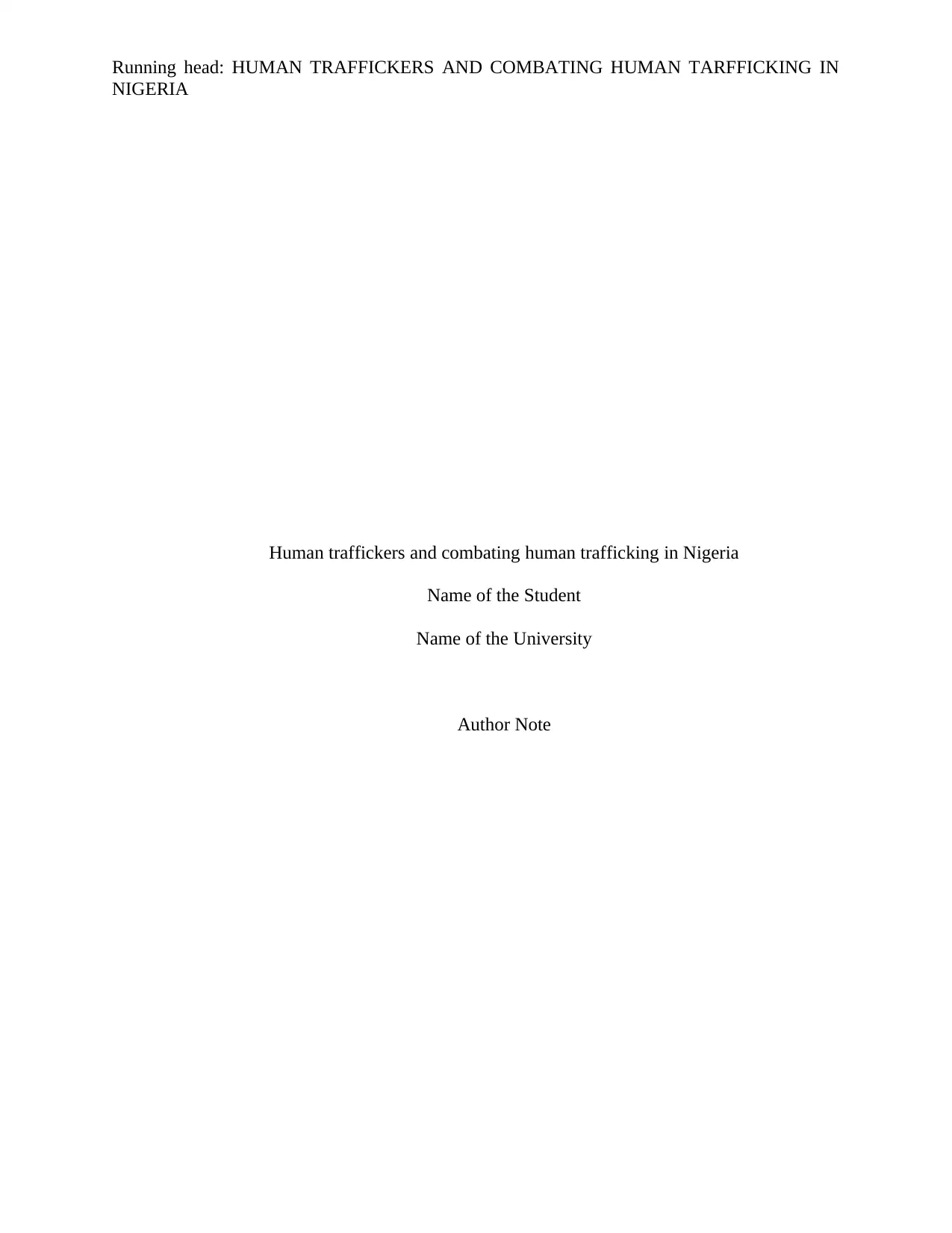
Running head: HUMAN TRAFFICKERS AND COMBATING HUMAN TARFFICKING IN
NIGERIA
Human traffickers and combating human trafficking in Nigeria
Name of the Student
Name of the University
Author Note
NIGERIA
Human traffickers and combating human trafficking in Nigeria
Name of the Student
Name of the University
Author Note
Paraphrase This Document
Need a fresh take? Get an instant paraphrase of this document with our AI Paraphraser
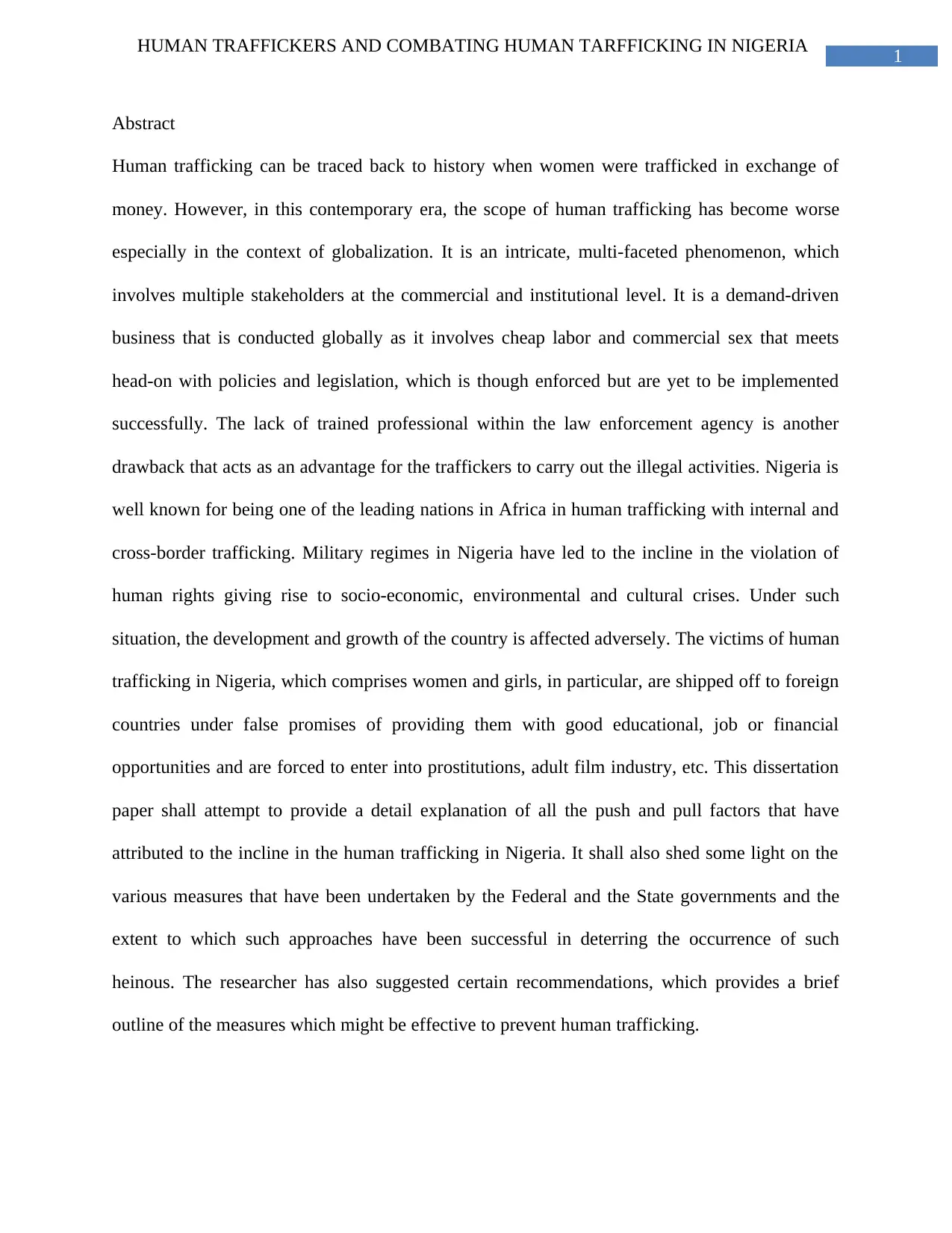
1
HUMAN TRAFFICKERS AND COMBATING HUMAN TARFFICKING IN NIGERIA
Abstract
Human trafficking can be traced back to history when women were trafficked in exchange of
money. However, in this contemporary era, the scope of human trafficking has become worse
especially in the context of globalization. It is an intricate, multi-faceted phenomenon, which
involves multiple stakeholders at the commercial and institutional level. It is a demand-driven
business that is conducted globally as it involves cheap labor and commercial sex that meets
head-on with policies and legislation, which is though enforced but are yet to be implemented
successfully. The lack of trained professional within the law enforcement agency is another
drawback that acts as an advantage for the traffickers to carry out the illegal activities. Nigeria is
well known for being one of the leading nations in Africa in human trafficking with internal and
cross-border trafficking. Military regimes in Nigeria have led to the incline in the violation of
human rights giving rise to socio-economic, environmental and cultural crises. Under such
situation, the development and growth of the country is affected adversely. The victims of human
trafficking in Nigeria, which comprises women and girls, in particular, are shipped off to foreign
countries under false promises of providing them with good educational, job or financial
opportunities and are forced to enter into prostitutions, adult film industry, etc. This dissertation
paper shall attempt to provide a detail explanation of all the push and pull factors that have
attributed to the incline in the human trafficking in Nigeria. It shall also shed some light on the
various measures that have been undertaken by the Federal and the State governments and the
extent to which such approaches have been successful in deterring the occurrence of such
heinous. The researcher has also suggested certain recommendations, which provides a brief
outline of the measures which might be effective to prevent human trafficking.
HUMAN TRAFFICKERS AND COMBATING HUMAN TARFFICKING IN NIGERIA
Abstract
Human trafficking can be traced back to history when women were trafficked in exchange of
money. However, in this contemporary era, the scope of human trafficking has become worse
especially in the context of globalization. It is an intricate, multi-faceted phenomenon, which
involves multiple stakeholders at the commercial and institutional level. It is a demand-driven
business that is conducted globally as it involves cheap labor and commercial sex that meets
head-on with policies and legislation, which is though enforced but are yet to be implemented
successfully. The lack of trained professional within the law enforcement agency is another
drawback that acts as an advantage for the traffickers to carry out the illegal activities. Nigeria is
well known for being one of the leading nations in Africa in human trafficking with internal and
cross-border trafficking. Military regimes in Nigeria have led to the incline in the violation of
human rights giving rise to socio-economic, environmental and cultural crises. Under such
situation, the development and growth of the country is affected adversely. The victims of human
trafficking in Nigeria, which comprises women and girls, in particular, are shipped off to foreign
countries under false promises of providing them with good educational, job or financial
opportunities and are forced to enter into prostitutions, adult film industry, etc. This dissertation
paper shall attempt to provide a detail explanation of all the push and pull factors that have
attributed to the incline in the human trafficking in Nigeria. It shall also shed some light on the
various measures that have been undertaken by the Federal and the State governments and the
extent to which such approaches have been successful in deterring the occurrence of such
heinous. The researcher has also suggested certain recommendations, which provides a brief
outline of the measures which might be effective to prevent human trafficking.
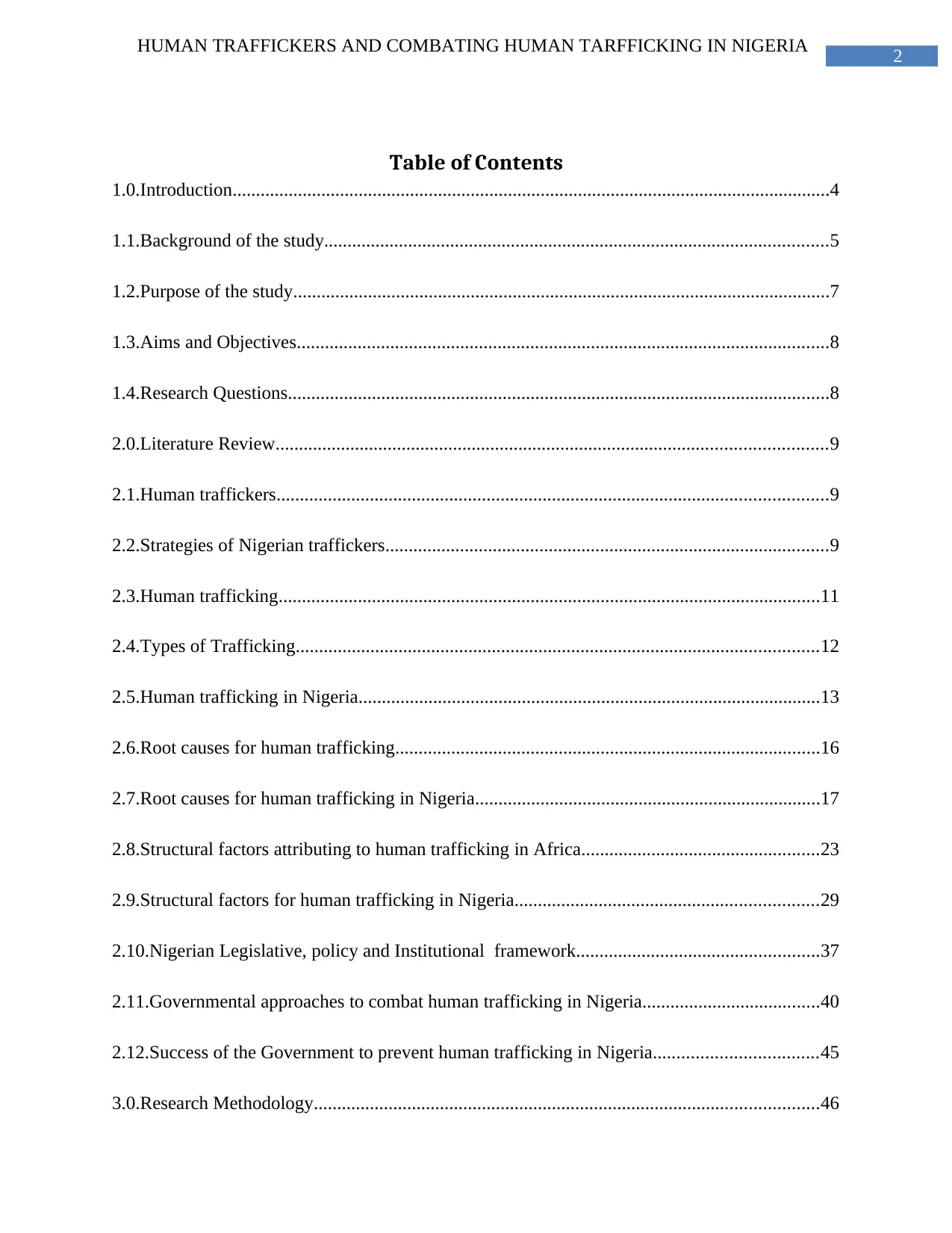
2
HUMAN TRAFFICKERS AND COMBATING HUMAN TARFFICKING IN NIGERIA
Table of Contents
1.0.Introduction................................................................................................................................4
1.1.Background of the study............................................................................................................5
1.2.Purpose of the study...................................................................................................................7
1.3.Aims and Objectives..................................................................................................................8
1.4.Research Questions....................................................................................................................8
2.0.Literature Review......................................................................................................................9
2.1.Human traffickers......................................................................................................................9
2.2.Strategies of Nigerian traffickers...............................................................................................9
2.3.Human trafficking....................................................................................................................11
2.4.Types of Trafficking................................................................................................................12
2.5.Human trafficking in Nigeria...................................................................................................13
2.6.Root causes for human trafficking...........................................................................................16
2.7.Root causes for human trafficking in Nigeria..........................................................................17
2.8.Structural factors attributing to human trafficking in Africa...................................................23
2.9.Structural factors for human trafficking in Nigeria.................................................................29
2.10.Nigerian Legislative, policy and Institutional framework....................................................37
2.11.Governmental approaches to combat human trafficking in Nigeria......................................40
2.12.Success of the Government to prevent human trafficking in Nigeria...................................45
3.0.Research Methodology............................................................................................................46
HUMAN TRAFFICKERS AND COMBATING HUMAN TARFFICKING IN NIGERIA
Table of Contents
1.0.Introduction................................................................................................................................4
1.1.Background of the study............................................................................................................5
1.2.Purpose of the study...................................................................................................................7
1.3.Aims and Objectives..................................................................................................................8
1.4.Research Questions....................................................................................................................8
2.0.Literature Review......................................................................................................................9
2.1.Human traffickers......................................................................................................................9
2.2.Strategies of Nigerian traffickers...............................................................................................9
2.3.Human trafficking....................................................................................................................11
2.4.Types of Trafficking................................................................................................................12
2.5.Human trafficking in Nigeria...................................................................................................13
2.6.Root causes for human trafficking...........................................................................................16
2.7.Root causes for human trafficking in Nigeria..........................................................................17
2.8.Structural factors attributing to human trafficking in Africa...................................................23
2.9.Structural factors for human trafficking in Nigeria.................................................................29
2.10.Nigerian Legislative, policy and Institutional framework....................................................37
2.11.Governmental approaches to combat human trafficking in Nigeria......................................40
2.12.Success of the Government to prevent human trafficking in Nigeria...................................45
3.0.Research Methodology............................................................................................................46
⊘ This is a preview!⊘
Do you want full access?
Subscribe today to unlock all pages.

Trusted by 1+ million students worldwide
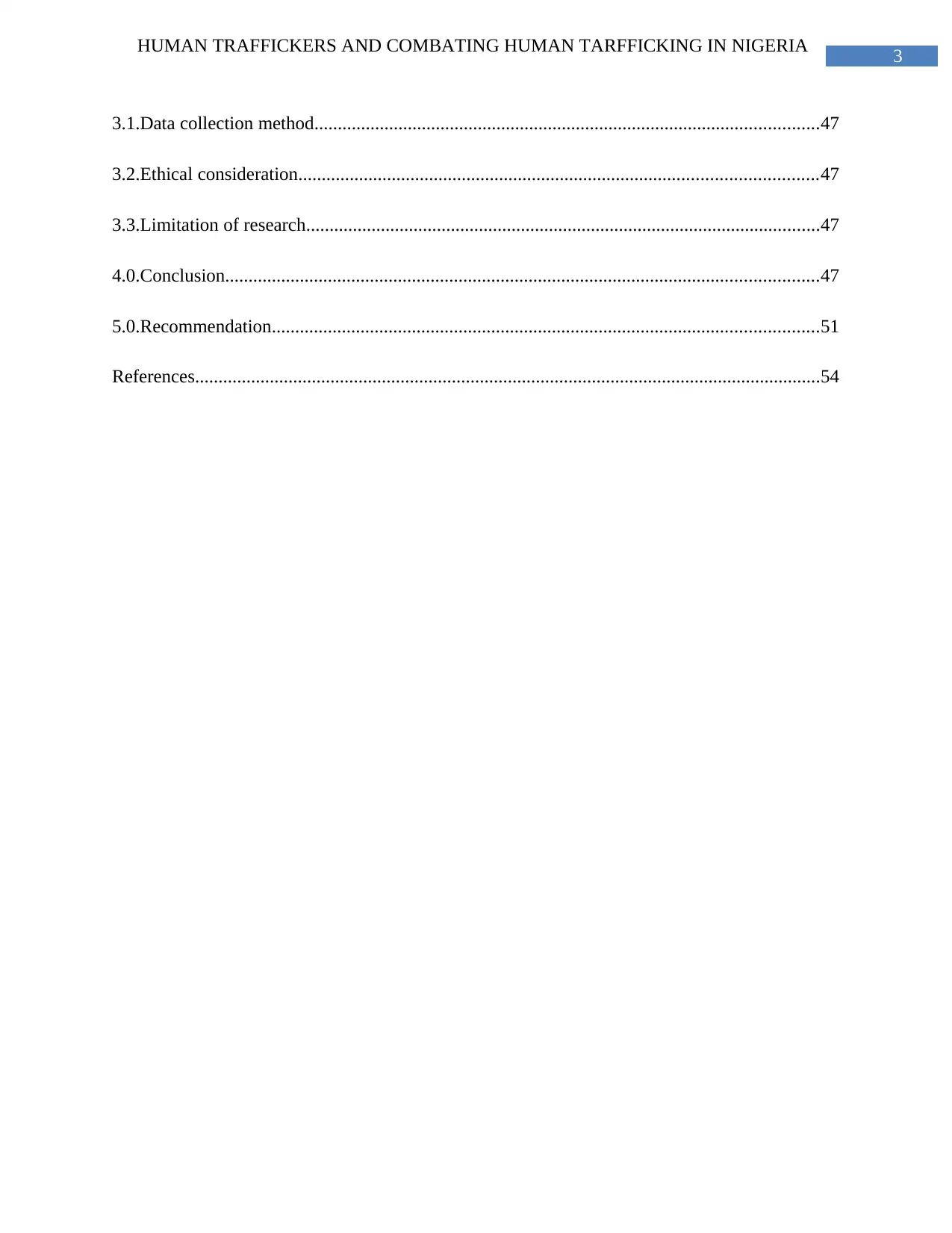
3
HUMAN TRAFFICKERS AND COMBATING HUMAN TARFFICKING IN NIGERIA
3.1.Data collection method............................................................................................................47
3.2.Ethical consideration...............................................................................................................47
3.3.Limitation of research..............................................................................................................47
4.0.Conclusion...............................................................................................................................47
5.0.Recommendation.....................................................................................................................51
References......................................................................................................................................54
HUMAN TRAFFICKERS AND COMBATING HUMAN TARFFICKING IN NIGERIA
3.1.Data collection method............................................................................................................47
3.2.Ethical consideration...............................................................................................................47
3.3.Limitation of research..............................................................................................................47
4.0.Conclusion...............................................................................................................................47
5.0.Recommendation.....................................................................................................................51
References......................................................................................................................................54
Paraphrase This Document
Need a fresh take? Get an instant paraphrase of this document with our AI Paraphraser
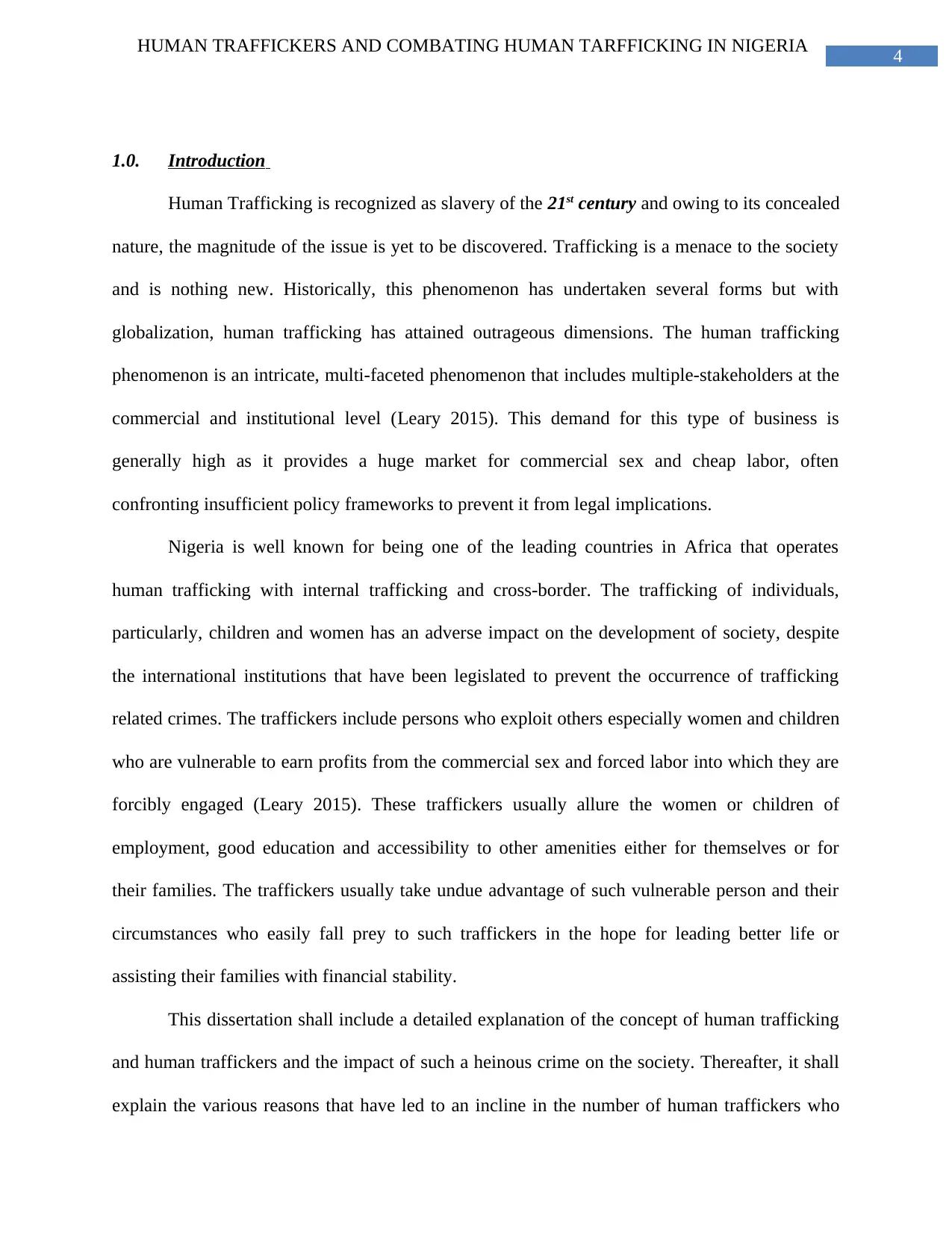
4
HUMAN TRAFFICKERS AND COMBATING HUMAN TARFFICKING IN NIGERIA
1.0. Introduction
Human Trafficking is recognized as slavery of the 21st century and owing to its concealed
nature, the magnitude of the issue is yet to be discovered. Trafficking is a menace to the society
and is nothing new. Historically, this phenomenon has undertaken several forms but with
globalization, human trafficking has attained outrageous dimensions. The human trafficking
phenomenon is an intricate, multi-faceted phenomenon that includes multiple-stakeholders at the
commercial and institutional level (Leary 2015). This demand for this type of business is
generally high as it provides a huge market for commercial sex and cheap labor, often
confronting insufficient policy frameworks to prevent it from legal implications.
Nigeria is well known for being one of the leading countries in Africa that operates
human trafficking with internal trafficking and cross-border. The trafficking of individuals,
particularly, children and women has an adverse impact on the development of society, despite
the international institutions that have been legislated to prevent the occurrence of trafficking
related crimes. The traffickers include persons who exploit others especially women and children
who are vulnerable to earn profits from the commercial sex and forced labor into which they are
forcibly engaged (Leary 2015). These traffickers usually allure the women or children of
employment, good education and accessibility to other amenities either for themselves or for
their families. The traffickers usually take undue advantage of such vulnerable person and their
circumstances who easily fall prey to such traffickers in the hope for leading better life or
assisting their families with financial stability.
This dissertation shall include a detailed explanation of the concept of human trafficking
and human traffickers and the impact of such a heinous crime on the society. Thereafter, it shall
explain the various reasons that have led to an incline in the number of human traffickers who
HUMAN TRAFFICKERS AND COMBATING HUMAN TARFFICKING IN NIGERIA
1.0. Introduction
Human Trafficking is recognized as slavery of the 21st century and owing to its concealed
nature, the magnitude of the issue is yet to be discovered. Trafficking is a menace to the society
and is nothing new. Historically, this phenomenon has undertaken several forms but with
globalization, human trafficking has attained outrageous dimensions. The human trafficking
phenomenon is an intricate, multi-faceted phenomenon that includes multiple-stakeholders at the
commercial and institutional level (Leary 2015). This demand for this type of business is
generally high as it provides a huge market for commercial sex and cheap labor, often
confronting insufficient policy frameworks to prevent it from legal implications.
Nigeria is well known for being one of the leading countries in Africa that operates
human trafficking with internal trafficking and cross-border. The trafficking of individuals,
particularly, children and women has an adverse impact on the development of society, despite
the international institutions that have been legislated to prevent the occurrence of trafficking
related crimes. The traffickers include persons who exploit others especially women and children
who are vulnerable to earn profits from the commercial sex and forced labor into which they are
forcibly engaged (Leary 2015). These traffickers usually allure the women or children of
employment, good education and accessibility to other amenities either for themselves or for
their families. The traffickers usually take undue advantage of such vulnerable person and their
circumstances who easily fall prey to such traffickers in the hope for leading better life or
assisting their families with financial stability.
This dissertation shall include a detailed explanation of the concept of human trafficking
and human traffickers and the impact of such a heinous crime on the society. Thereafter, it shall
explain the various reasons that have led to an incline in the number of human traffickers who
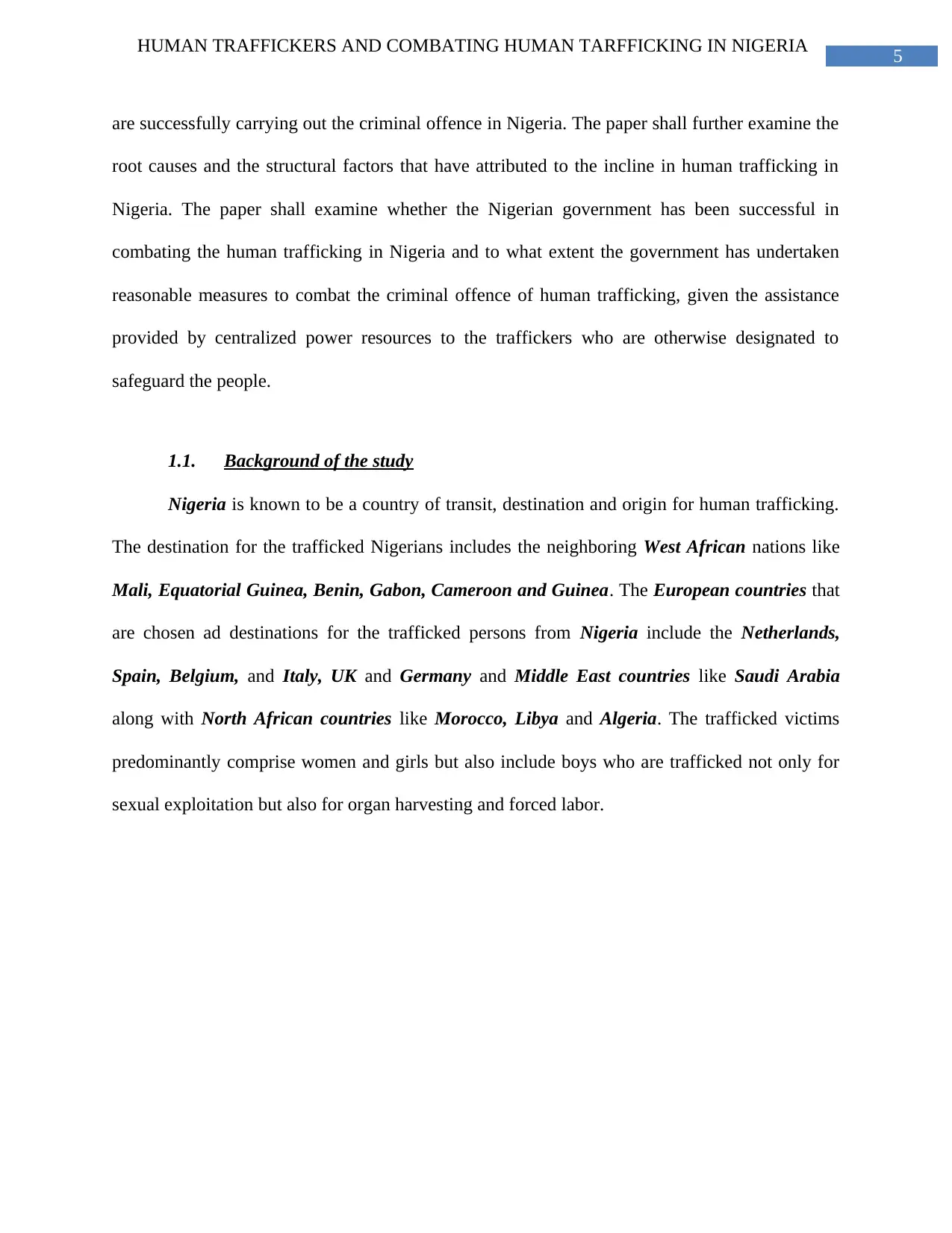
5
HUMAN TRAFFICKERS AND COMBATING HUMAN TARFFICKING IN NIGERIA
are successfully carrying out the criminal offence in Nigeria. The paper shall further examine the
root causes and the structural factors that have attributed to the incline in human trafficking in
Nigeria. The paper shall examine whether the Nigerian government has been successful in
combating the human trafficking in Nigeria and to what extent the government has undertaken
reasonable measures to combat the criminal offence of human trafficking, given the assistance
provided by centralized power resources to the traffickers who are otherwise designated to
safeguard the people.
1.1. Background of the study
Nigeria is known to be a country of transit, destination and origin for human trafficking.
The destination for the trafficked Nigerians includes the neighboring West African nations like
Mali, Equatorial Guinea, Benin, Gabon, Cameroon and Guinea. The European countries that
are chosen ad destinations for the trafficked persons from Nigeria include the Netherlands,
Spain, Belgium, and Italy, UK and Germany and Middle East countries like Saudi Arabia
along with North African countries like Morocco, Libya and Algeria. The trafficked victims
predominantly comprise women and girls but also include boys who are trafficked not only for
sexual exploitation but also for organ harvesting and forced labor.
HUMAN TRAFFICKERS AND COMBATING HUMAN TARFFICKING IN NIGERIA
are successfully carrying out the criminal offence in Nigeria. The paper shall further examine the
root causes and the structural factors that have attributed to the incline in human trafficking in
Nigeria. The paper shall examine whether the Nigerian government has been successful in
combating the human trafficking in Nigeria and to what extent the government has undertaken
reasonable measures to combat the criminal offence of human trafficking, given the assistance
provided by centralized power resources to the traffickers who are otherwise designated to
safeguard the people.
1.1. Background of the study
Nigeria is known to be a country of transit, destination and origin for human trafficking.
The destination for the trafficked Nigerians includes the neighboring West African nations like
Mali, Equatorial Guinea, Benin, Gabon, Cameroon and Guinea. The European countries that
are chosen ad destinations for the trafficked persons from Nigeria include the Netherlands,
Spain, Belgium, and Italy, UK and Germany and Middle East countries like Saudi Arabia
along with North African countries like Morocco, Libya and Algeria. The trafficked victims
predominantly comprise women and girls but also include boys who are trafficked not only for
sexual exploitation but also for organ harvesting and forced labor.
⊘ This is a preview!⊘
Do you want full access?
Subscribe today to unlock all pages.

Trusted by 1+ million students worldwide
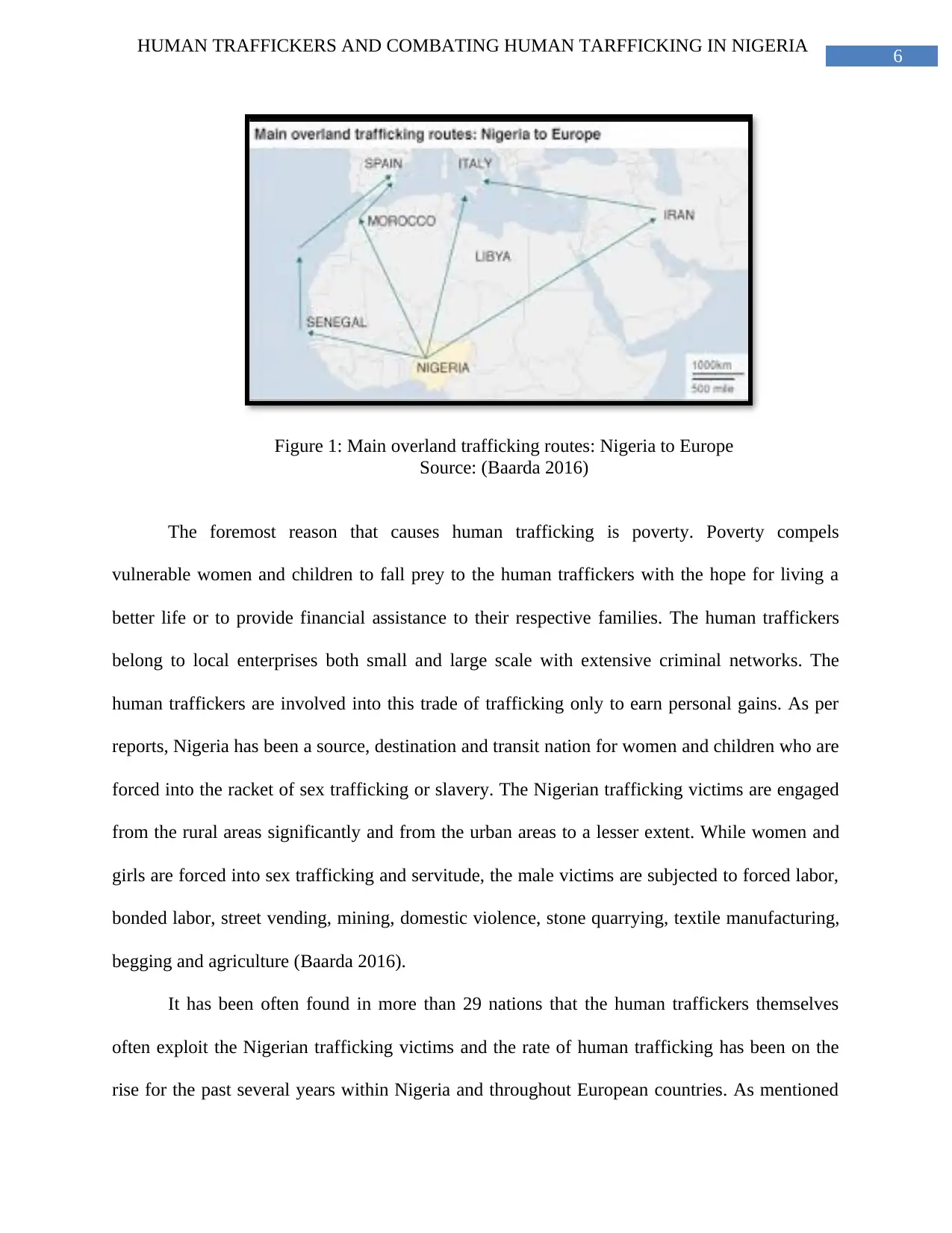
6
HUMAN TRAFFICKERS AND COMBATING HUMAN TARFFICKING IN NIGERIA
Figure 1: Main overland trafficking routes: Nigeria to Europe
Source: (Baarda 2016)
The foremost reason that causes human trafficking is poverty. Poverty compels
vulnerable women and children to fall prey to the human traffickers with the hope for living a
better life or to provide financial assistance to their respective families. The human traffickers
belong to local enterprises both small and large scale with extensive criminal networks. The
human traffickers are involved into this trade of trafficking only to earn personal gains. As per
reports, Nigeria has been a source, destination and transit nation for women and children who are
forced into the racket of sex trafficking or slavery. The Nigerian trafficking victims are engaged
from the rural areas significantly and from the urban areas to a lesser extent. While women and
girls are forced into sex trafficking and servitude, the male victims are subjected to forced labor,
bonded labor, street vending, mining, domestic violence, stone quarrying, textile manufacturing,
begging and agriculture (Baarda 2016).
It has been often found in more than 29 nations that the human traffickers themselves
often exploit the Nigerian trafficking victims and the rate of human trafficking has been on the
rise for the past several years within Nigeria and throughout European countries. As mentioned
HUMAN TRAFFICKERS AND COMBATING HUMAN TARFFICKING IN NIGERIA
Figure 1: Main overland trafficking routes: Nigeria to Europe
Source: (Baarda 2016)
The foremost reason that causes human trafficking is poverty. Poverty compels
vulnerable women and children to fall prey to the human traffickers with the hope for living a
better life or to provide financial assistance to their respective families. The human traffickers
belong to local enterprises both small and large scale with extensive criminal networks. The
human traffickers are involved into this trade of trafficking only to earn personal gains. As per
reports, Nigeria has been a source, destination and transit nation for women and children who are
forced into the racket of sex trafficking or slavery. The Nigerian trafficking victims are engaged
from the rural areas significantly and from the urban areas to a lesser extent. While women and
girls are forced into sex trafficking and servitude, the male victims are subjected to forced labor,
bonded labor, street vending, mining, domestic violence, stone quarrying, textile manufacturing,
begging and agriculture (Baarda 2016).
It has been often found in more than 29 nations that the human traffickers themselves
often exploit the Nigerian trafficking victims and the rate of human trafficking has been on the
rise for the past several years within Nigeria and throughout European countries. As mentioned
Paraphrase This Document
Need a fresh take? Get an instant paraphrase of this document with our AI Paraphraser
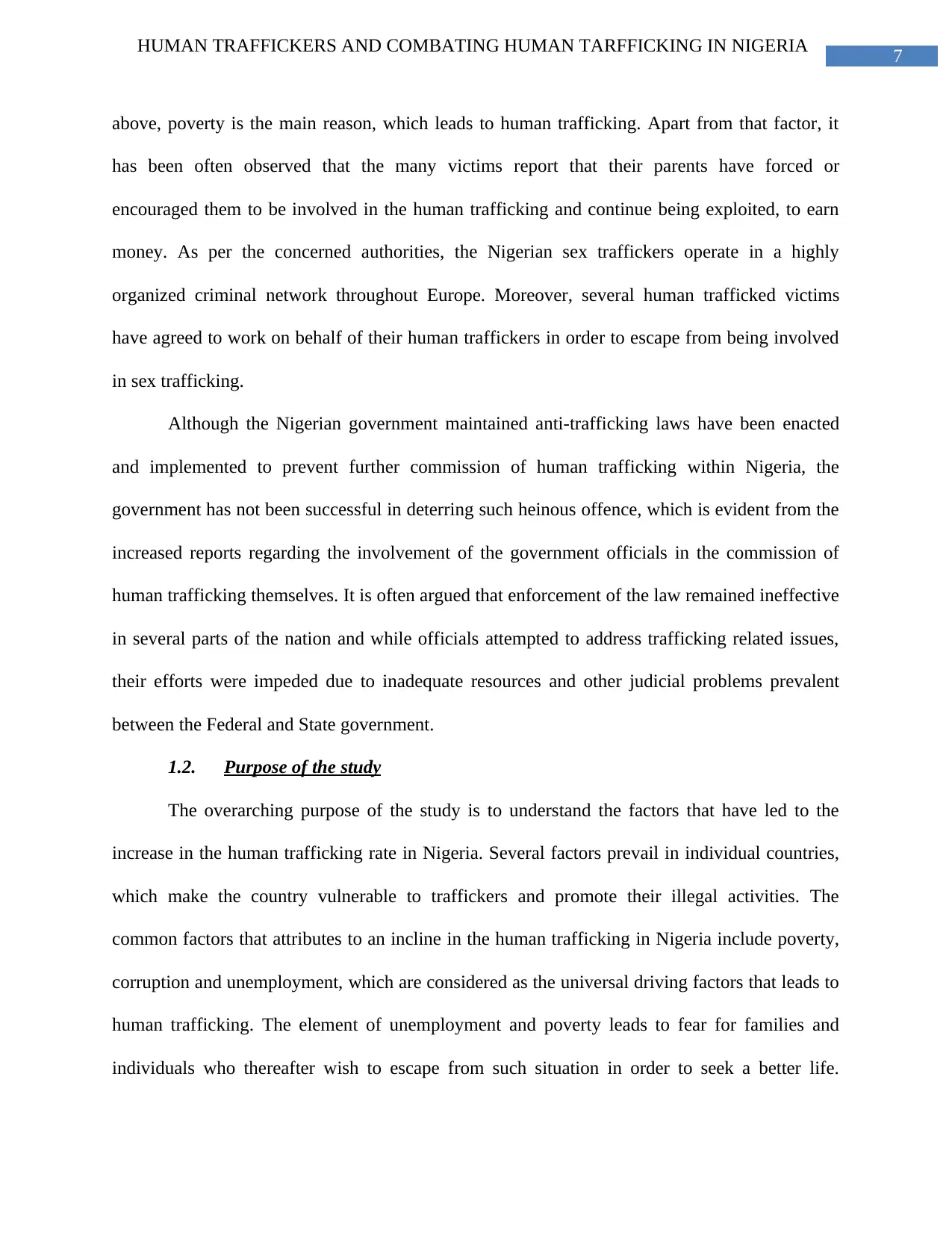
7
HUMAN TRAFFICKERS AND COMBATING HUMAN TARFFICKING IN NIGERIA
above, poverty is the main reason, which leads to human trafficking. Apart from that factor, it
has been often observed that the many victims report that their parents have forced or
encouraged them to be involved in the human trafficking and continue being exploited, to earn
money. As per the concerned authorities, the Nigerian sex traffickers operate in a highly
organized criminal network throughout Europe. Moreover, several human trafficked victims
have agreed to work on behalf of their human traffickers in order to escape from being involved
in sex trafficking.
Although the Nigerian government maintained anti-trafficking laws have been enacted
and implemented to prevent further commission of human trafficking within Nigeria, the
government has not been successful in deterring such heinous offence, which is evident from the
increased reports regarding the involvement of the government officials in the commission of
human trafficking themselves. It is often argued that enforcement of the law remained ineffective
in several parts of the nation and while officials attempted to address trafficking related issues,
their efforts were impeded due to inadequate resources and other judicial problems prevalent
between the Federal and State government.
1.2. Purpose of the study
The overarching purpose of the study is to understand the factors that have led to the
increase in the human trafficking rate in Nigeria. Several factors prevail in individual countries,
which make the country vulnerable to traffickers and promote their illegal activities. The
common factors that attributes to an incline in the human trafficking in Nigeria include poverty,
corruption and unemployment, which are considered as the universal driving factors that leads to
human trafficking. The element of unemployment and poverty leads to fear for families and
individuals who thereafter wish to escape from such situation in order to seek a better life.
HUMAN TRAFFICKERS AND COMBATING HUMAN TARFFICKING IN NIGERIA
above, poverty is the main reason, which leads to human trafficking. Apart from that factor, it
has been often observed that the many victims report that their parents have forced or
encouraged them to be involved in the human trafficking and continue being exploited, to earn
money. As per the concerned authorities, the Nigerian sex traffickers operate in a highly
organized criminal network throughout Europe. Moreover, several human trafficked victims
have agreed to work on behalf of their human traffickers in order to escape from being involved
in sex trafficking.
Although the Nigerian government maintained anti-trafficking laws have been enacted
and implemented to prevent further commission of human trafficking within Nigeria, the
government has not been successful in deterring such heinous offence, which is evident from the
increased reports regarding the involvement of the government officials in the commission of
human trafficking themselves. It is often argued that enforcement of the law remained ineffective
in several parts of the nation and while officials attempted to address trafficking related issues,
their efforts were impeded due to inadequate resources and other judicial problems prevalent
between the Federal and State government.
1.2. Purpose of the study
The overarching purpose of the study is to understand the factors that have led to the
increase in the human trafficking rate in Nigeria. Several factors prevail in individual countries,
which make the country vulnerable to traffickers and promote their illegal activities. The
common factors that attributes to an incline in the human trafficking in Nigeria include poverty,
corruption and unemployment, which are considered as the universal driving factors that leads to
human trafficking. The element of unemployment and poverty leads to fear for families and
individuals who thereafter wish to escape from such situation in order to seek a better life.
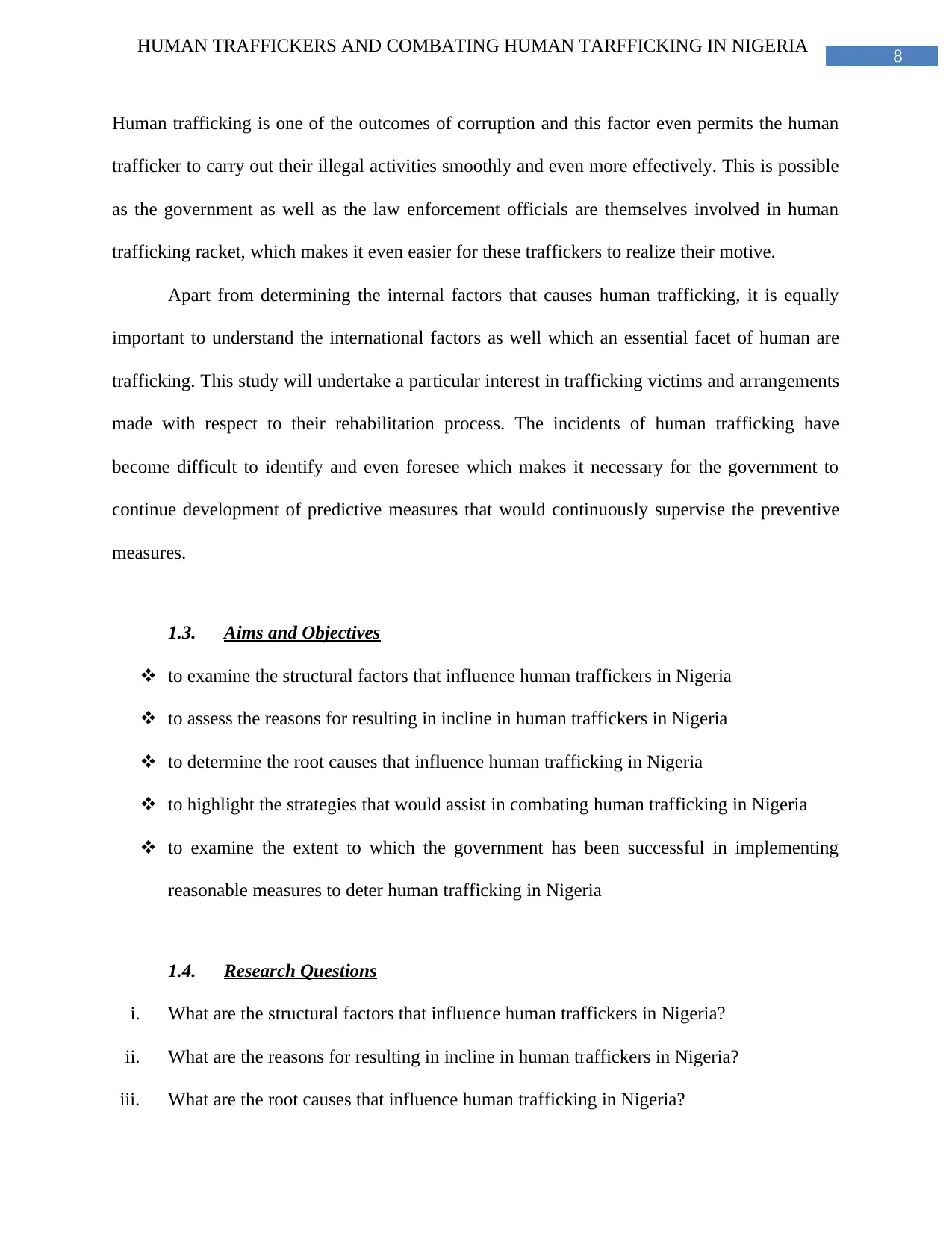
8
HUMAN TRAFFICKERS AND COMBATING HUMAN TARFFICKING IN NIGERIA
Human trafficking is one of the outcomes of corruption and this factor even permits the human
trafficker to carry out their illegal activities smoothly and even more effectively. This is possible
as the government as well as the law enforcement officials are themselves involved in human
trafficking racket, which makes it even easier for these traffickers to realize their motive.
Apart from determining the internal factors that causes human trafficking, it is equally
important to understand the international factors as well which an essential facet of human are
trafficking. This study will undertake a particular interest in trafficking victims and arrangements
made with respect to their rehabilitation process. The incidents of human trafficking have
become difficult to identify and even foresee which makes it necessary for the government to
continue development of predictive measures that would continuously supervise the preventive
measures.
1.3. Aims and Objectives
to examine the structural factors that influence human traffickers in Nigeria
to assess the reasons for resulting in incline in human traffickers in Nigeria
to determine the root causes that influence human trafficking in Nigeria
to highlight the strategies that would assist in combating human trafficking in Nigeria
to examine the extent to which the government has been successful in implementing
reasonable measures to deter human trafficking in Nigeria
1.4. Research Questions
i. What are the structural factors that influence human traffickers in Nigeria?
ii. What are the reasons for resulting in incline in human traffickers in Nigeria?
iii. What are the root causes that influence human trafficking in Nigeria?
HUMAN TRAFFICKERS AND COMBATING HUMAN TARFFICKING IN NIGERIA
Human trafficking is one of the outcomes of corruption and this factor even permits the human
trafficker to carry out their illegal activities smoothly and even more effectively. This is possible
as the government as well as the law enforcement officials are themselves involved in human
trafficking racket, which makes it even easier for these traffickers to realize their motive.
Apart from determining the internal factors that causes human trafficking, it is equally
important to understand the international factors as well which an essential facet of human are
trafficking. This study will undertake a particular interest in trafficking victims and arrangements
made with respect to their rehabilitation process. The incidents of human trafficking have
become difficult to identify and even foresee which makes it necessary for the government to
continue development of predictive measures that would continuously supervise the preventive
measures.
1.3. Aims and Objectives
to examine the structural factors that influence human traffickers in Nigeria
to assess the reasons for resulting in incline in human traffickers in Nigeria
to determine the root causes that influence human trafficking in Nigeria
to highlight the strategies that would assist in combating human trafficking in Nigeria
to examine the extent to which the government has been successful in implementing
reasonable measures to deter human trafficking in Nigeria
1.4. Research Questions
i. What are the structural factors that influence human traffickers in Nigeria?
ii. What are the reasons for resulting in incline in human traffickers in Nigeria?
iii. What are the root causes that influence human trafficking in Nigeria?
⊘ This is a preview!⊘
Do you want full access?
Subscribe today to unlock all pages.

Trusted by 1+ million students worldwide
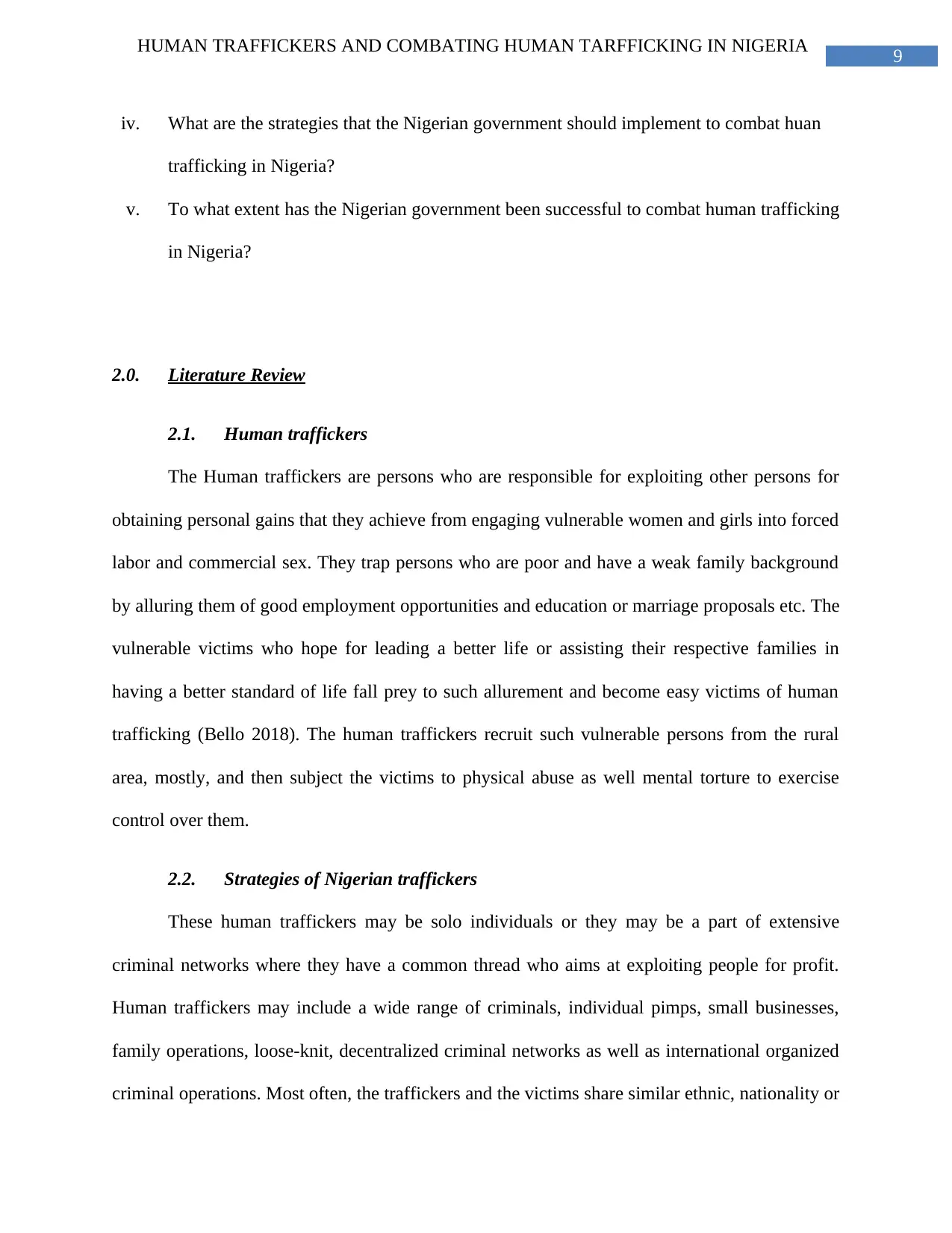
9
HUMAN TRAFFICKERS AND COMBATING HUMAN TARFFICKING IN NIGERIA
iv. What are the strategies that the Nigerian government should implement to combat huan
trafficking in Nigeria?
v. To what extent has the Nigerian government been successful to combat human trafficking
in Nigeria?
2.0. Literature Review
2.1. Human traffickers
The Human traffickers are persons who are responsible for exploiting other persons for
obtaining personal gains that they achieve from engaging vulnerable women and girls into forced
labor and commercial sex. They trap persons who are poor and have a weak family background
by alluring them of good employment opportunities and education or marriage proposals etc. The
vulnerable victims who hope for leading a better life or assisting their respective families in
having a better standard of life fall prey to such allurement and become easy victims of human
trafficking (Bello 2018). The human traffickers recruit such vulnerable persons from the rural
area, mostly, and then subject the victims to physical abuse as well mental torture to exercise
control over them.
2.2. Strategies of Nigerian traffickers
These human traffickers may be solo individuals or they may be a part of extensive
criminal networks where they have a common thread who aims at exploiting people for profit.
Human traffickers may include a wide range of criminals, individual pimps, small businesses,
family operations, loose-knit, decentralized criminal networks as well as international organized
criminal operations. Most often, the traffickers and the victims share similar ethnic, nationality or
HUMAN TRAFFICKERS AND COMBATING HUMAN TARFFICKING IN NIGERIA
iv. What are the strategies that the Nigerian government should implement to combat huan
trafficking in Nigeria?
v. To what extent has the Nigerian government been successful to combat human trafficking
in Nigeria?
2.0. Literature Review
2.1. Human traffickers
The Human traffickers are persons who are responsible for exploiting other persons for
obtaining personal gains that they achieve from engaging vulnerable women and girls into forced
labor and commercial sex. They trap persons who are poor and have a weak family background
by alluring them of good employment opportunities and education or marriage proposals etc. The
vulnerable victims who hope for leading a better life or assisting their respective families in
having a better standard of life fall prey to such allurement and become easy victims of human
trafficking (Bello 2018). The human traffickers recruit such vulnerable persons from the rural
area, mostly, and then subject the victims to physical abuse as well mental torture to exercise
control over them.
2.2. Strategies of Nigerian traffickers
These human traffickers may be solo individuals or they may be a part of extensive
criminal networks where they have a common thread who aims at exploiting people for profit.
Human traffickers may include a wide range of criminals, individual pimps, small businesses,
family operations, loose-knit, decentralized criminal networks as well as international organized
criminal operations. Most often, the traffickers and the victims share similar ethnic, nationality or
Paraphrase This Document
Need a fresh take? Get an instant paraphrase of this document with our AI Paraphraser
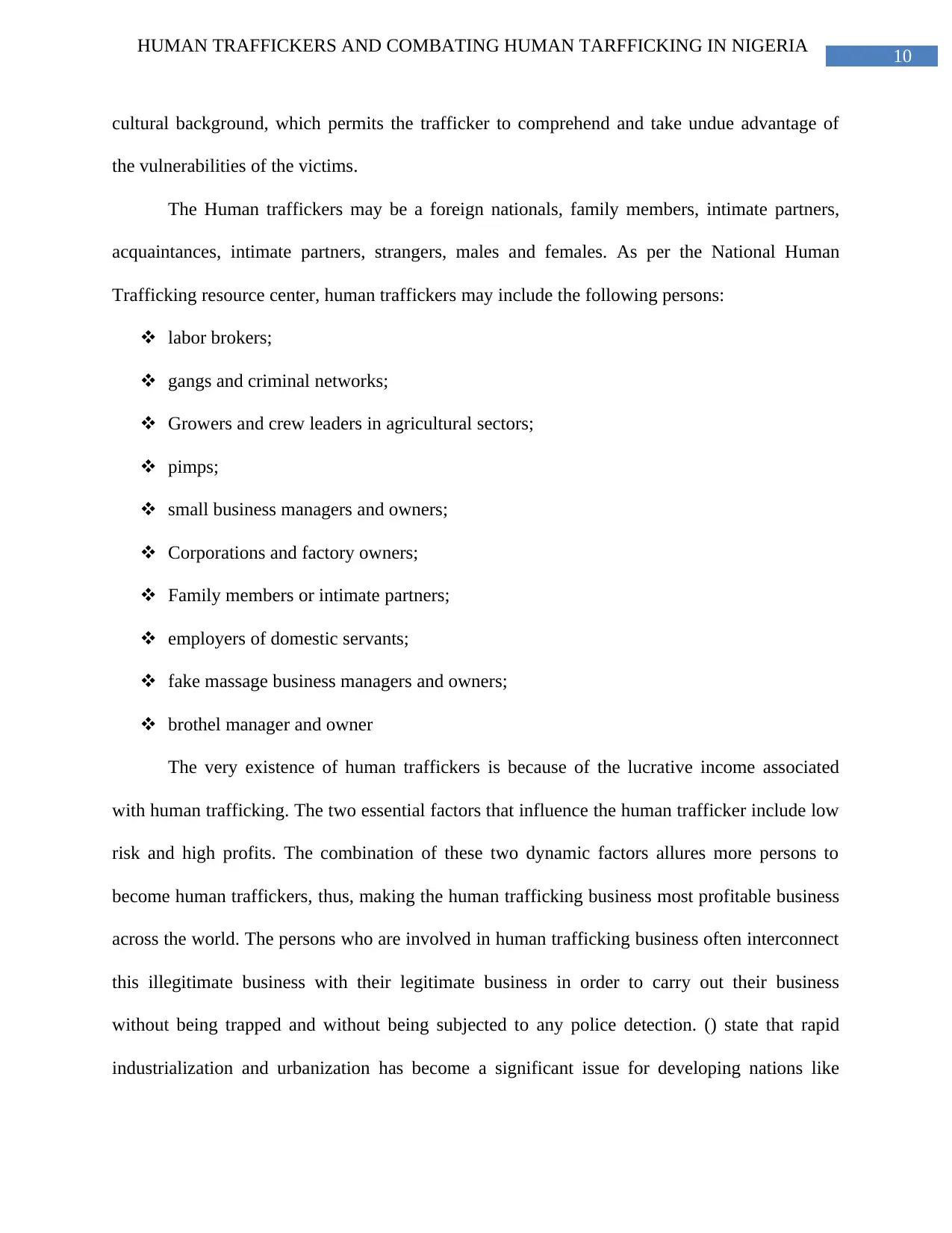
10
HUMAN TRAFFICKERS AND COMBATING HUMAN TARFFICKING IN NIGERIA
cultural background, which permits the trafficker to comprehend and take undue advantage of
the vulnerabilities of the victims.
The Human traffickers may be a foreign nationals, family members, intimate partners,
acquaintances, intimate partners, strangers, males and females. As per the National Human
Trafficking resource center, human traffickers may include the following persons:
labor brokers;
gangs and criminal networks;
Growers and crew leaders in agricultural sectors;
pimps;
small business managers and owners;
Corporations and factory owners;
Family members or intimate partners;
employers of domestic servants;
fake massage business managers and owners;
brothel manager and owner
The very existence of human traffickers is because of the lucrative income associated
with human trafficking. The two essential factors that influence the human trafficker include low
risk and high profits. The combination of these two dynamic factors allures more persons to
become human traffickers, thus, making the human trafficking business most profitable business
across the world. The persons who are involved in human trafficking business often interconnect
this illegitimate business with their legitimate business in order to carry out their business
without being trapped and without being subjected to any police detection. () state that rapid
industrialization and urbanization has become a significant issue for developing nations like
HUMAN TRAFFICKERS AND COMBATING HUMAN TARFFICKING IN NIGERIA
cultural background, which permits the trafficker to comprehend and take undue advantage of
the vulnerabilities of the victims.
The Human traffickers may be a foreign nationals, family members, intimate partners,
acquaintances, intimate partners, strangers, males and females. As per the National Human
Trafficking resource center, human traffickers may include the following persons:
labor brokers;
gangs and criminal networks;
Growers and crew leaders in agricultural sectors;
pimps;
small business managers and owners;
Corporations and factory owners;
Family members or intimate partners;
employers of domestic servants;
fake massage business managers and owners;
brothel manager and owner
The very existence of human traffickers is because of the lucrative income associated
with human trafficking. The two essential factors that influence the human trafficker include low
risk and high profits. The combination of these two dynamic factors allures more persons to
become human traffickers, thus, making the human trafficking business most profitable business
across the world. The persons who are involved in human trafficking business often interconnect
this illegitimate business with their legitimate business in order to carry out their business
without being trapped and without being subjected to any police detection. () state that rapid
industrialization and urbanization has become a significant issue for developing nations like
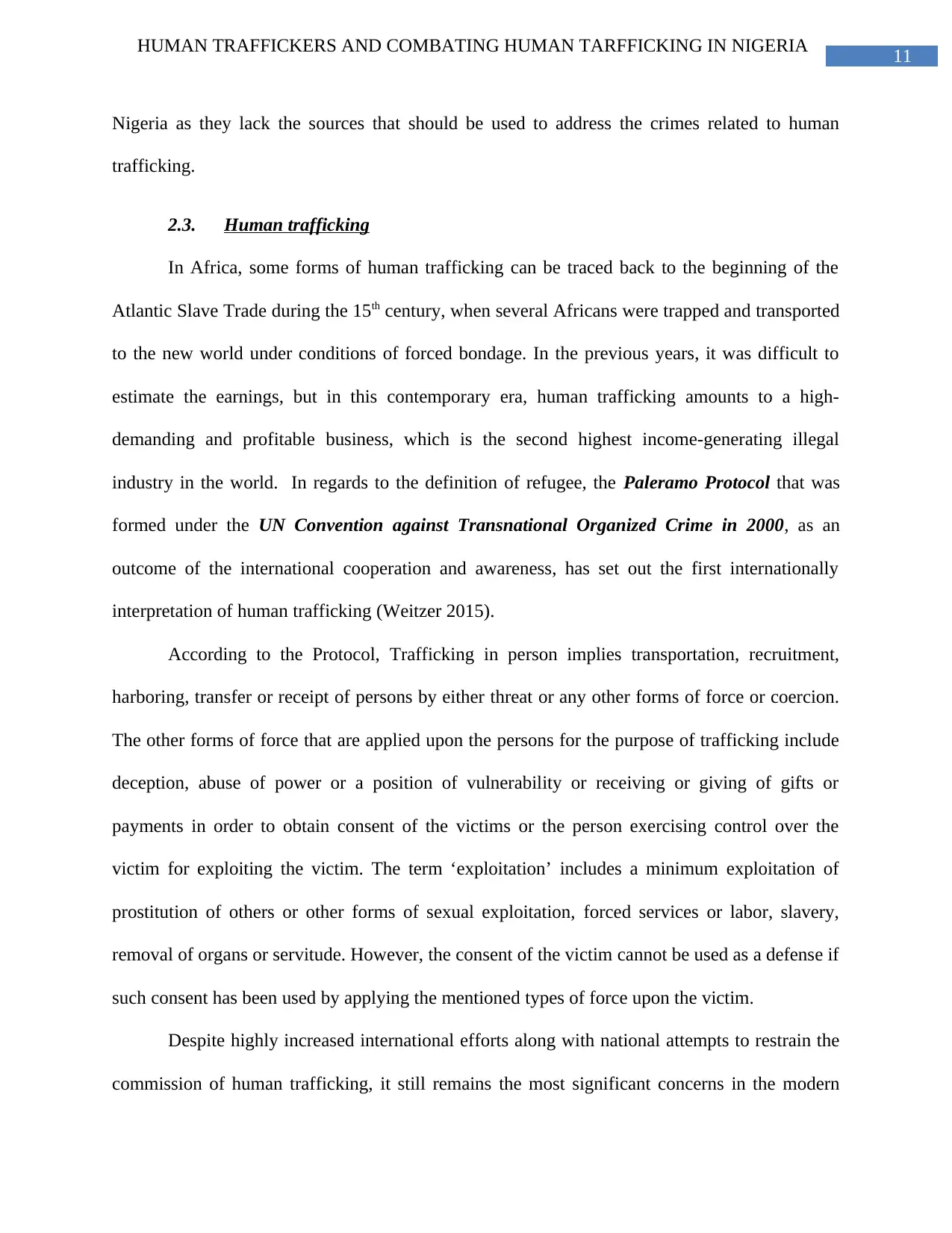
11
HUMAN TRAFFICKERS AND COMBATING HUMAN TARFFICKING IN NIGERIA
Nigeria as they lack the sources that should be used to address the crimes related to human
trafficking.
2.3. Human trafficking
In Africa, some forms of human trafficking can be traced back to the beginning of the
Atlantic Slave Trade during the 15th century, when several Africans were trapped and transported
to the new world under conditions of forced bondage. In the previous years, it was difficult to
estimate the earnings, but in this contemporary era, human trafficking amounts to a high-
demanding and profitable business, which is the second highest income-generating illegal
industry in the world. In regards to the definition of refugee, the Paleramo Protocol that was
formed under the UN Convention against Transnational Organized Crime in 2000, as an
outcome of the international cooperation and awareness, has set out the first internationally
interpretation of human trafficking (Weitzer 2015).
According to the Protocol, Trafficking in person implies transportation, recruitment,
harboring, transfer or receipt of persons by either threat or any other forms of force or coercion.
The other forms of force that are applied upon the persons for the purpose of trafficking include
deception, abuse of power or a position of vulnerability or receiving or giving of gifts or
payments in order to obtain consent of the victims or the person exercising control over the
victim for exploiting the victim. The term ‘exploitation’ includes a minimum exploitation of
prostitution of others or other forms of sexual exploitation, forced services or labor, slavery,
removal of organs or servitude. However, the consent of the victim cannot be used as a defense if
such consent has been used by applying the mentioned types of force upon the victim.
Despite highly increased international efforts along with national attempts to restrain the
commission of human trafficking, it still remains the most significant concerns in the modern
HUMAN TRAFFICKERS AND COMBATING HUMAN TARFFICKING IN NIGERIA
Nigeria as they lack the sources that should be used to address the crimes related to human
trafficking.
2.3. Human trafficking
In Africa, some forms of human trafficking can be traced back to the beginning of the
Atlantic Slave Trade during the 15th century, when several Africans were trapped and transported
to the new world under conditions of forced bondage. In the previous years, it was difficult to
estimate the earnings, but in this contemporary era, human trafficking amounts to a high-
demanding and profitable business, which is the second highest income-generating illegal
industry in the world. In regards to the definition of refugee, the Paleramo Protocol that was
formed under the UN Convention against Transnational Organized Crime in 2000, as an
outcome of the international cooperation and awareness, has set out the first internationally
interpretation of human trafficking (Weitzer 2015).
According to the Protocol, Trafficking in person implies transportation, recruitment,
harboring, transfer or receipt of persons by either threat or any other forms of force or coercion.
The other forms of force that are applied upon the persons for the purpose of trafficking include
deception, abuse of power or a position of vulnerability or receiving or giving of gifts or
payments in order to obtain consent of the victims or the person exercising control over the
victim for exploiting the victim. The term ‘exploitation’ includes a minimum exploitation of
prostitution of others or other forms of sexual exploitation, forced services or labor, slavery,
removal of organs or servitude. However, the consent of the victim cannot be used as a defense if
such consent has been used by applying the mentioned types of force upon the victim.
Despite highly increased international efforts along with national attempts to restrain the
commission of human trafficking, it still remains the most significant concerns in the modern
⊘ This is a preview!⊘
Do you want full access?
Subscribe today to unlock all pages.

Trusted by 1+ million students worldwide
1 out of 64
Your All-in-One AI-Powered Toolkit for Academic Success.
+13062052269
info@desklib.com
Available 24*7 on WhatsApp / Email
![[object Object]](/_next/static/media/star-bottom.7253800d.svg)
Unlock your academic potential
Copyright © 2020–2026 A2Z Services. All Rights Reserved. Developed and managed by ZUCOL.